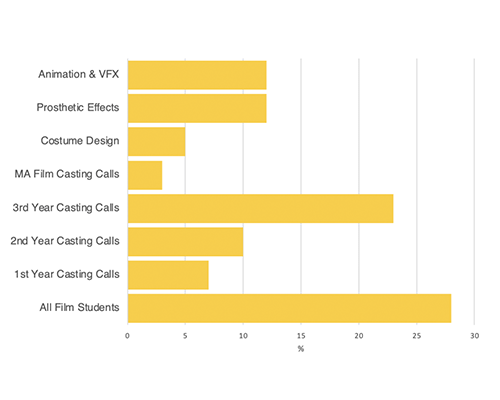In this article, Digital Learning takes a look at a shared space within the Learning Space built for the School of Film and TV.
Collaborative learning will not be unfamiliar to our students, indeed it’s built into the curriculum in ways students will recognise such as group work and projects. These collaborative opportunities will be common to arts subjects and are especially relevant for those studying Film and Television where working inter and intra-disciplinary is vital.
To help facilitate student-initiated collaboration across the School of Film and Television (SoFT), without developing new systems or processes, it was decided the Learning Space would provide a stable and familiar platform from which students could build upon existing networking opportunities.
Late 2020, Digital Learning worked with SoFT in creating a Learning Space page for these student collaborations. SoFT academic, Paul Mulraney from the Film course team, provides the background on why this came about and the value it has for our students.
Film Collaborations was set up during the early days of the pandemic in response to the urgent need for an online collaborative tool. The normal ways of instigating inter and intra-disciplinary collaboration had become difficult due to the lack of in-person contact – both staff and student-initiated networking events were not possible, and student-led Facebook groups had become scattered and hard to access. Absent these usual means it became very difficult for Film students to meet and collaborate with their peers on other courses such as Acting, Costume Design, Animation, VFX, Prosthetics and Make-up.
Working with Digital Learning, we specified a ‘top-level’ Learning Space page that would exist outside of the visibility of any specific course or school. Using Moodle’s forum functionality, we allowed students to target emails to specific cohorts of students on other courses, using easy ‘call’ templates the students posted their crew requirements and the details of their projects. This targeting kept chatter to a minimum, ensuring that the crew calls found the right audience.
This became a valuable tool that allowed a large number of films to crew up that otherwise would have struggled to do so, enabling a higher production value as a result of this activity. At the point of writing the platform is still going strong. With 30 films having found collaborators from other courses to date, the use case for the platform has been proven. It has continued to grow with new courses added in 21/22 at the request of course leaders in other schools.
It’s often a challenge to quantify the success and value of any collaboration, as Dr Russell Crawford suggests when offering useful ways we might measure it.
“Looking and measuring ‘collaboration’ as a concept in higher education is a nebulous and subjective endeavour”
– Dr Russell Crawford, Director of Learning & Teaching, Falmouth University1
However, as Paul noted, the number of productions finding collaborators, along with the engagement and participation within the Learning Space page, is an indication of the success of this tool as an additional means of networking. And as Course Leader for Film, Dr Laura Canning observed:
“It’s vital that from their very first weeks at SoFT, students understand film as an interdisciplinary practice that requires them to identify collaborators across a range of other courses – this Learning Space page has been a fantastic way for them to do this.”
“The result is that Film - an intensively collaborative course by nature and design – has come through the pandemic with its thriving culture of open innovation and networked production well and truly in place.”
– Dr Laura Canning, Course Leader for Film
Below is data from 12 months of participation. Note that engagement doesn’t follow a traditional module where students interact in various activities, instead the page functions as a private noticeboard; posts are made, details provided and responses collated, usually via other means such as email.
March 2021 – March 2022 | Student visitors (315 student visitors)

Ratio of students who made one or more post | Ratio of students who made one or more visit
March 2021 – March 2022 | Forum visits (Percentage of 315 student visitors)
 NB: specific forum membership is restricted, based on cohort criteria. The number visiting “All Film Students” include visitors to that forum only. Staff posts and views have not been included in these figures.
NB: specific forum membership is restricted, based on cohort criteria. The number visiting “All Film Students” include visitors to that forum only. Staff posts and views have not been included in these figures.
An advantage to using institutional learning systems and tools, over availability and the ability to track usage, is providing a private space where students have control of their personal data. This can help to reduce risks surrounding General Data Protection Regulation (GDPR), when handling personal and private data and provides a safer more secure means of networking for our students.
In conclusion:
- targeting minimised chatter, ensuring crew calls found the right audience,
- forums became a valuable tool, helping to establish a number of crews that otherwise may have struggled to do so during the pandemic,
- overall, films had higher production values as a result of this activity.
If you are interested in pursuing similar projects for your School or discipline, please contact DLSupport@falmouth.ac.uk
If you’re a member of staff and don’t currently have access to the Film Collaborations page, please contact Paul Mulraney from the Film course team, before requesting access from Digital Learning.
1 Crawford, R. (2022) ‘Is it possible to measure collaboration?’, AdvancedHE, 12 January 2022. Available at: https://www.advance-he.ac.uk/news-and-views/it-possible-measure-collaboration (Accessed: 21 March 2022).

